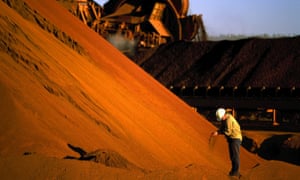Lobby group calls on miners to stick together, saying a united voice is more effective to deal with government
Big miner BHP
is again reviewing its membership of the Minerals Council of Australia
lobby group following disagreements over environmental policy.
Last month, BHP chief executive Andrew Mackenzie described global heating as indisputable and called for drastic action in response, including but not limited to carbon pricing.
The Minerals Council moderated some of its policies after BHP announced a 12-month review of its membership in December 2017 but the Guardian understands that, despite the changes, and the resignation of its then CEO, Brendan Pearson, senior BHP executives believe the council needs to do more.
BHP pulled out of the World Coal Association last year but decided to
remain a Minerals Council member after objecting to its advocacy on
energy policy, including calling for government support for new
coal-fired power plants in Australia.Last month, BHP chief executive Andrew Mackenzie described global heating as indisputable and called for drastic action in response, including but not limited to carbon pricing.
The Minerals Council moderated some of its policies after BHP announced a 12-month review of its membership in December 2017 but the Guardian understands that, despite the changes, and the resignation of its then CEO, Brendan Pearson, senior BHP executives believe the council needs to do more.
The council is trying to hold its members together amid divisions over climate and energy policy. Its members include multinationals BHP and Rio Tinto, which provide the lion’s share of its funding, and smaller specialist miners less concerned about attempts to reduce greenhouse gas emissions. Rio also put pressure on the council last year over its anti-climate policy advocacy but it is understood the company is no longer considering pulling out.
BHP’s climate pledge, announced by Mackenzie in a speech in London a fortnight ago, includes a promise to spend US$400m (about $590m) to develop technologies to reduce emissions from its own operations and the “scope 3” emissions that result downstream from the companies that buy its resources. It says it will limit its 2022 pollution at 2017 levels and have net-zero emissions by 2050. Mackenzie said the company would strengthen the link between emissions performance and executive pay from 2021.
"BHP cannot keep walking both sides of the street"
The Minerals Council chair, former Liberal government minister Helen Coonan, told the Guardian she did not know if BHP was reviewing its membership of the body. “The vice-chair of the MCA is Mike Henry from BHP. We’ve had many conversations about challenges right across the spectrum in the sector but I’ve not had any conversations of the kind that you allude to,” she said.
She said there had been tensions with the company in the past over issues including the use of money from another industry body, Coal21 – which shares some directors with the council – on advertisements extolling the virtues of coal. “But I have a very clear understanding that some of those tensions, if not all of them, have been resolved, at least for the time being, and none of them have been raised with me,” Coonan said.
The former MP called on the industry to stick with the council and not splinter into separate lobby groups. “A united voice is a much more effective way to deal with government, to deal with regulators, to deal with interest groups, than if you had a fragmented voice.”
The council’s emphasis has shifted under Pearson’s replacement, Tania Constable, to saying that coal has a strong future as part of a “technology neutral” approach. Pearson is now an adviser to the prime minister, Scott Morrison.
Constable welcomed Mackenzie’s speech, saying it was in line with the Minerals Council’s support of the Paris climate agreement. According to the Intergovernmental Panel on Climate Change, limiting global heating to 1.5C, a goal referenced in the Paris agreement, would require coal use for energy to fall 59-78% below 2010 levels by 2030.
Coonan said the council believed there was a place for “competing technologies”, listing renewables with storage, coal, gas, carbon capture and storage and “possibly even nuclear energy”.
“We don’t see that we’re completely out of step with BHP and we don’t see that we’re out of step with the coal interests either, because of our technology neutral approach,” she said.
Climate groups said there was a clear divide between BHP’s goals and the Minerals Council’s public advocacy.
The Australasian Centre for Corporate Responsibility, a shareholder activist group, said the council had recently called for investment in new coal-fired power plants, and had run more than 40 pro-coal advertisements on Facebook and campaigned for the approval of the Adani Carmichael mine. Dan Gocher, the centre’s director of climate and environment, said these steps were “completely inconsistent” with BHP’s position.
Matt Rose, an economist with the Australian Conservation Foundation, said the council was taking a destructive approach on public policy and called on BHP to withdraw its membership. “BHP cannot keep walking both sides of the street, talking up climate action on one hand and funding the minerals council to trash it on the other,” he said.
The director of policy with the Investor Group on Climate Change, Erwin Jackson, declined to comment on the BHP case, but said institutional investors were increasingly interested in whether industry associations were supporting or undermining climate action.
He said critics had tried to dismiss concerns from institutional investors as the work of a few activists. In reality, he said, hundreds of investors controlling trillions of dollars were working with companies to minimise risks associated with climate change.
“To try to portray investors as activists demonstrates a failure to understand that climate change is a core financial risk for investors and a systemic risk to the financial system and the economy,” he said.

No comments:
Post a Comment